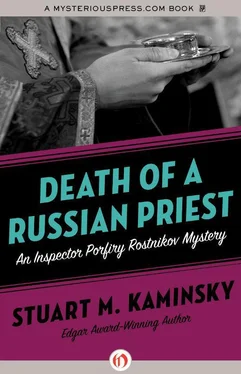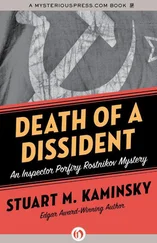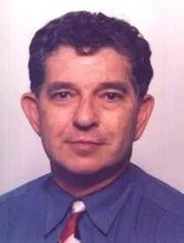Stuart Kaminsky - Death Of A Russian Priest
Здесь есть возможность читать онлайн «Stuart Kaminsky - Death Of A Russian Priest» весь текст электронной книги совершенно бесплатно (целиком полную версию без сокращений). В некоторых случаях можно слушать аудио, скачать через торрент в формате fb2 и присутствует краткое содержание. Год выпуска: 2012, Жанр: Полицейский детектив, на английском языке. Описание произведения, (предисловие) а так же отзывы посетителей доступны на портале библиотеки ЛибКат.
- Название:Death Of A Russian Priest
- Автор:
- Жанр:
- Год:2012
- ISBN:нет данных
- Рейтинг книги:3 / 5. Голосов: 1
-
Избранное:Добавить в избранное
- Отзывы:
-
Ваша оценка:
- 60
- 1
- 2
- 3
- 4
- 5
Death Of A Russian Priest: краткое содержание, описание и аннотация
Предлагаем к чтению аннотацию, описание, краткое содержание или предисловие (зависит от того, что написал сам автор книги «Death Of A Russian Priest»). Если вы не нашли необходимую информацию о книге — напишите в комментариях, мы постараемся отыскать её.
Death Of A Russian Priest — читать онлайн бесплатно полную книгу (весь текст) целиком
Ниже представлен текст книги, разбитый по страницам. Система сохранения места последней прочитанной страницы, позволяет с удобством читать онлайн бесплатно книгу «Death Of A Russian Priest», без необходимости каждый раз заново искать на чём Вы остановились. Поставьте закладку, и сможете в любой момент перейти на страницу, на которой закончили чтение.
Интервал:
Закладка:
“And she gains-”
“-time,” Sasha concluded.
“We should find an Englishman named Peter Chesney quickly.”
“We should,” Tkach agreed.
“You want me to give you some help?” asked Elena. She reached out to take his arm as a quartet of arguing women hurried by on their way toward the trolley stop.
“Get a cab,” he said. “Porfiry Petrovich will approve the fare.”
Through a window of the Byelorussian railway station Leonid Dovnik had a clear view of Mayakovsky Square and the heavy traffic coming across the bridge on what he still thought of as Leningrad Prospekt. He had noted when he entered the station almost an hour earlier that the clock above the entrance was broken, but his cherished American Timex told him it was almost noon.
He had found the Englishman Chesney with no difficulty. He had simply called the British embassy, identified himself as a Russian businessman, and expressed interest in talking to a Peter Chesney about a possible import arrangement. He willingly gave a number where he could be reached and said his business was rather urgent and that he would soon have to leave for the German embassy. The British had no reason to doubt him. If Dovnik were MVD or any other branch, he would not have needed the embassy.
The British woman had called back within ten minutes and told him the phone number and address of the trade office where Chesney could be found.
He had called the office to be sure that Chesney was in and then had gone to wait for him, the photograph he had taken from Chesney’s room safely in the pocket of his near-leather jacket. Chesney had emerged from the office building, briefcase in hand, just before eleven.
Leonid had followed him on the green line of the metro, looking for an opportunity to get the man alone. None had arisen, and now he stood patiently watching the traffic go by. Through breaks in the traffic he could see the Englishman standing below the statue of the poet Mayakovsky, who, with his left hand in his pocket, looked silently down at the automobiles.
Chesney waited on the open, treeless concrete island for no more than five minutes before two men appeared. Leonid Dovnik reached into his pocket, pulled out his glasses, and put them on to get a better view.
The two men wore dark tailored suits. They stood close to Chesney and glanced around as they spoke. One of them looked directly across at Leonid, who stepped back from the window.
The conversation among the three took no more than three minutes and then the two men shook hands with Chesney and walked away.
Chesney looked around, then headed across the busy street toward the metro station. Leonid decided to make his move. He would hurry ahead of the Englishman and encounter him before he went down the escalator. Using his knife, he would guide him to a delivery entrance of the Sofia Restaurant, where they could be alone. Then Leonid Dovnik would persuade Chesney to tell him where the girl could be found.
He hurried toward the exit, trying to keep track of Chesney through the steamy windows. He did not see the man who stepped in front of him till they almost collided.
“Out of the way,” Dovnik said, putting up a hand to push the man aside.
Another man appeared to block the way. Leonid stopped and looked at the two men before him. They resembled the two who had just met with Chesney. Leonid’s quarry, meanwhile, was getting away.
“We would like to discuss a business proposition with you,” one of the men said. He had a thick accent.
It was one of the busiest railway stations in Moscow, and people were streaming past them. Leonid was about to throw the men aside and make a path for himself when he realized that the two men who had been across the square moments ago were a dozen yards away and moving toward him. Leonid put both hands in his jacket pockets and found his switchblade. He had purchased it for more rubles than it was worth, but it had been a prize he could not resist.
“Will you please accompany us?” one of the men said, pulling his hand out of his pocket just enough to reveal a pistol.
“You won’t shoot that here,” Leonid said.
“You have three seconds to walk with us,” the man said. “If you are not walking, I shall shoot you.”
And Leonid knew that it was so. “A proposition?” he asked.
“A proposition,” the man with the pistol agreed.
Leonid shrugged and removed his hand from his pocket. The knife eased down comfortably against his ribs.
People were watching them. A family of four stopped arguing to glance at them, then resumed their quarrel. There were conspiracies being hatched in bars and public buildings and on the streets throughout the city these days, and the people who moved past them had their own thoughts and needs.
When they were outside on the Garden Ring Road, a large black car pulled up to the curb. The car’s windows were dark. The backdoor swung open, and as Leonid Dovnik was guided in he wondered whether he should fight and run. The desire to fight, however, was overcome by his curiosity. He got in without a word and the car sped into the noon traffic with a blast of the horn.
Rostnikov heard a noise outside the party hall and the door sprang open. Four men entered. Two of them were ancient, and one of them-who could have been any age from sixteen to thirty-was obviously retarded. The fourth man was sullen and bewildered. They were followed by Officer Misha Gonsk.
“Here they are,” Gonsk announced triumphantly.
“I see,” said Rostnikov, rising and putting Karpo’s report down on the table. “Who are they?”
“The Olegs,” Gonsk announced. “All the Olegs in Arkush, except the children.”
“You have done a wondrous job, tovarish,” said Rostnikov. Karpo had told him of the nun’s assurance that it was not an Oleg who had killed the priest and that none of the Olegs in Arkush was the one the dying priest had mentioned. Karpo had believed her, and Rostnikov had accepted his belief. The dying priest’s Oleg might well be important, but he was not one of the frightened men who had entered the room.
“Would you gentlemen like tea?”
The old men moved forward to accept a cup from the policeman. The sullen man shouted, “What is this about? I just got back to town an hour ago. I’ve been in Moscow for five days trying to sell my wife’s preserves.”
“Is that true, Officer Gonsk?” asked Rostnikov.
“It seems so,” said Gonsk, keeping a wary eye on the four, particularly the retarded one, who was smiling at him.
“Seems so?” said the businessman. “You can talk to my cousins, the-look at my train tickets.”
“Did you know Father Merhum and Sister Nina?”
“Everyone knew them,” the man said. “I’m a religious man. My family is religious.”
“A month ago he was a party member and an atheist,” said one of the two old men drinking tea.
“They lie,” said the businessman. “I only pretended.”
“Your whole life?” said the other old Oleg.
“A great actor,” said the first Oleg.
“A what’s-his-name, a Cary Gable.”
“Inspector,” cried the business Oleg.
Rostnikov put his finger to his lips to quiet the business Oleg and then motioned to the retarded Oleg, who ambled toward him, smiling. Rostnikov sat him down and poured him a cup of tea. “Gonsk,” he said. “Go in the kitchen. Find them something to eat. Cookies, something. Then take them home.”
“You don’t understand, Inspector. These are the only Olegs in Arkush. There are no others.”
“Then we must look in Minsk,” said Rostnikov.
“Minsk? Why Minsk?” asked Gonsk.
“At the moment it is as likely a place as any,” said Rostnikov.
“Minsk?”
“It is a joke,” said Rostnikov.
Читать дальшеИнтервал:
Закладка:
Похожие книги на «Death Of A Russian Priest»
Представляем Вашему вниманию похожие книги на «Death Of A Russian Priest» списком для выбора. Мы отобрали схожую по названию и смыслу литературу в надежде предоставить читателям больше вариантов отыскать новые, интересные, ещё непрочитанные произведения.
Обсуждение, отзывы о книге «Death Of A Russian Priest» и просто собственные мнения читателей. Оставьте ваши комментарии, напишите, что Вы думаете о произведении, его смысле или главных героях. Укажите что конкретно понравилось, а что нет, и почему Вы так считаете.












